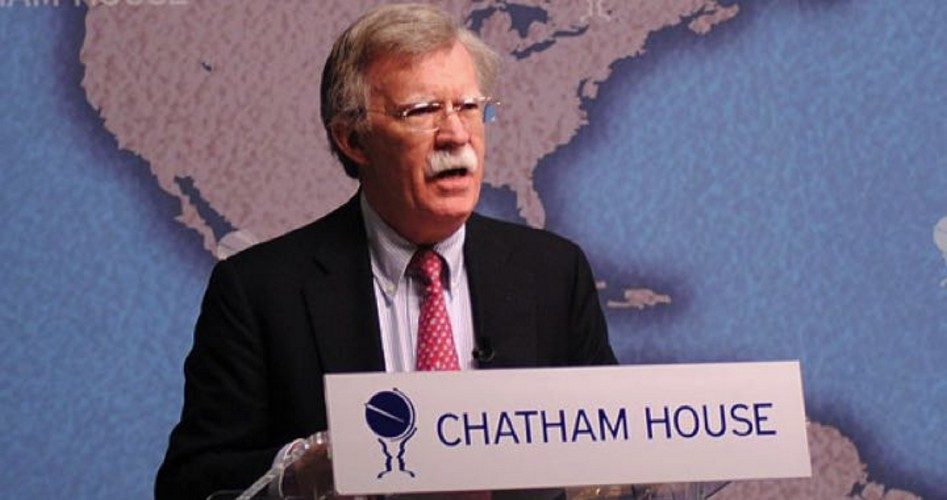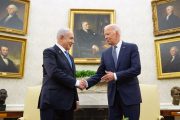
President Trump announced in a tweet on March 22 that he is naming former ambassador to the United Nations John Bolton as his new national security advisor, replacing Lt. Gen. H.R. McMaster. Bolton is currently a senior fellow at the American Enterprise Institute (AEI). Both Bolton and McMaster are members of the internationalist Council on Foreign Relations (CFR).
Trump’s tweet read: “I am pleased to announce that, effective 4/9/18, @AmbJohnBolton will be my new National Security Advisor. I am very thankful for the service of General H.R. McMaster who has done an outstanding job & will always remain my friend. There will be an official contact handover on 4/9.”
The American Enterprise Institute is regarded as an organization with strong neoconservative ties. Irving Kristol, who was once dubbed the “godfather neoconservatism,” was a senior fellow at the AEI beginning in 1977, and the John M. Olin Distinguished Fellow from 1988 to 1999.
{modulepos inner_text_ad}
CNN’s report about Bolton’s selection accurately described his foreign policy orientation, stating:
Bolton, a hawkish neoconservative, has advocated war with Iran and a pre-emptive strike on North Korea, and remains an unapologetic supporter of the Iraq War despite the flawed intelligence used to justify the US invasion….
For many, the concern is that the appointment of Bolton — exactly the kind of advocate for US overseas intervention that Trump pilloried on the campaign trail — marks a belligerent turn for the Trump administration that could doom attempts to save the Iran nuclear deal, increase the possibility of a clash with North Korea and ratchet up tensions with Moscow.
Bolton made his hawkish views apparent in an article he wrote in late February in the Wall Street Journal. In that article, he said that North Korea is an “imminent threat” to the United States because it is only months away from achieving the capacity to deliver nuclear warheads to the U.S. mainland. Therefore “it is perfectly legitimate” for the United States to defend itself “by striking [North Korea] first.”
Back in November 2016, shortly after Trump was elected, Bolton was named by some observers as a likely candidate to be the new president’s secretary of state. In response to this suggestion, Senator Rand Paul (R-Ky.), who is a consistent noninterventionist on foreign policy, wrote an op-ed on the website Rare warning Trump not to consider Bolton for the position. “No man is more out of touch with the situation in the Middle East or more dangerous to our national security than Bolton,” Paul wrote. The senator went on to write:
Woodrow Wilson would be proud, but the parents of our soldiers should be mortified. War should be the last resort, never the first. War should be understood to be a hell no one wishes for. Dwight Eisenhower understood this when he wrote, “I hate war like only a soldier can, the stupidity, the banality, the futility.”
Bolton would not understand this because, like many of his generation, he used every privilege to avoid serving himself. Bolton said, with the threat of the Vietnam draft over his head, that “he had no desire to die in a Southeast Asian rice paddy.” But he seems to be okay with your son or daughter dying wherever his neoconservative impulse leads us: “Even before the Iraq War, John Bolton was a leading brain behind the neoconservatives’ war-and-conquest agenda,” notes The American Conservative’s Jon Utley.
At a time when Americans thirst for change and new thinking, Bolton is an old hand at failed foreign policy.
The man is a menace….
President-elect Donald Trump campaigned on changing our disastrous foreign policy. To appoint John Bolton would be a major first step toward breaking that promise.
While the position of national security advisor (officially, the assistant to the president for national security affairs) is not a Cabinet post, the NSA still has much influence in a presidential administration as the chief in-house advisor to the president on national security issues. The NSA participates in meetings of the National Security Council (NSC) and usually chairs meetings of the Principals Committee of the NSC with the secretary of state and secretary of defense, which are meetings not attended by the president.
In such a role, Bolton would likely be second only to the secretary of state in influencing Trump’s foreign-policy decisions. Paul’s reservations about having Bolton serve as secretary of state should also be applied to having this proven interventionist serve in such a key role.
Photo of John Bolton: Chatham House via Wikimedia
Related article:
The McMaster Cabal: Lead Operatives in the Deep State Coup Effort to Oust Trump



